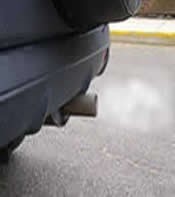|
FOR IMMEDIATE RELEASE |
Contact: Caryn Shinske (609) 984-1795 |
|
CHRISTIE ADMINISTRATION DESIGNATES MAY 1-5 AIR QUALITY AWARENESS WEEK IN NEW JERSEY (17/P38) TRENTON – The Department of Environmental Protection marks Air Quality Awareness Week the first week of May by encouraging residents to use common-sense measures to reduce pollution and improve air quality in their communities. Governor Christie has proclaimed May 1-5 as Air Quality Awareness Week in the Garden State, which focuses on education about air pollution and encourages residents to make changes in their daily routines that will positively impact air quality while also reducing impacts to human health and the environment. “Air Quality Awareness Week is a great opportunity to review how our lifestyle choices impact air quality,” DEP Commissioner Bob Martin said. “By making just a few simple changes, we can contribute to and enjoy cleaner air.” New Jersey’s air quality has improved significantly as a result of better pollution controls on cars, trucks and power plants. Also, consumer products now contain less volatile organic substances. Further, New Jersey has achieved the national standards set by the U.S. Environmental Protection Agency for fine particulate matter, but ozone air pollution remains a problem. While New Jersey has made significant progress in improving its air quality, more work is needed to meet federal ozone standards strengthened in 2015. “New Jersey residents can make a significant difference in air quality simply by making changes in how they maintain vehicles, drive, and use energy in their homes,” said Paul Baldauf, DEP’s Assistant Commissioner for Air Quality, Energy and Sustainability. “These routine measures add up to cleaner air in our communities, and result in improved public health for all.”
A strong respiratory irritant, smog can bring on asthma attacks and adversely affect the health of sensitive populations, such as those with respiratory and heart illness, older adults, young children, and people who are active outdoors. Consequently, residents are encouraged to protect themselves from the effects of smog. Some tips to reduce air pollutants include:
To learn more about ground-level ozone, visit: http://www.cleanair.nj.gov Everyone, especially those with health problems, is urged to check out DEP’s Air Monitoring Alert System. The system uses color codes to plan daily activities around current air quality conditions. Conditions are updated daily on the DEP’s Air Monitoring Web site, https://urldefense.com/v3/__http://www.njaqinow.net/__;!!J30X0ZrnC1oQtbA!ereTZ0VnsSe0tQyL6PgIRLx-L3CPpCQohkdBYWju8jZL0AWFg0s4SpIsjB51tUwI8HFcgw$ Over exertion on days with poor air quality can be harmful to your health. You may also subscribe to EnviroFlash, an online alert system that delivers air quality information to your email inbox or cell phone. You can also see air quality forecasts on Twitter and through RSS feeds through the EPA’s EnviroFlash system. Visit https://urldefense.com/v3/__http://www.enviroflash.info__;!!J30X0ZrnC1oQtbA!ereTZ0VnsSe0tQyL6PgIRLx-L3CPpCQohkdBYWju8jZL0AWFg0s4SpIsjB51tUxcGqJohQ$ To learn more about the DEP’s Department of Air Quality, Energy and Sustainability, follow the department on Facebook at https://urldefense.com/v3/__https://www.facebook.com/NJDEPAQES/__;!!J30X0ZrnC1oQtbA!ereTZ0VnsSe0tQyL6PgIRLx-L3CPpCQohkdBYWju8jZL0AWFg0s4SpIsjB51tUxt20w56Q$ ### |
|
 Some of those changes include combining automobile trips, keeping a vehicle’s maintenance up to date, using environmentally friendly cleaning products, not idling vehicles, and checking the state’s Air Quality Index (AQI) before heading outdoors.
Some of those changes include combining automobile trips, keeping a vehicle’s maintenance up to date, using environmentally friendly cleaning products, not idling vehicles, and checking the state’s Air Quality Index (AQI) before heading outdoors. Air Quality Awareness Week is timed to the start of ozone season, which begins as warmer weather approaches New Jersey. Ground-level ozone, also called smog, is a pollutant formed outdoors and is a problem for New Jersey and the northeastern United States.
Air Quality Awareness Week is timed to the start of ozone season, which begins as warmer weather approaches New Jersey. Ground-level ozone, also called smog, is a pollutant formed outdoors and is a problem for New Jersey and the northeastern United States.